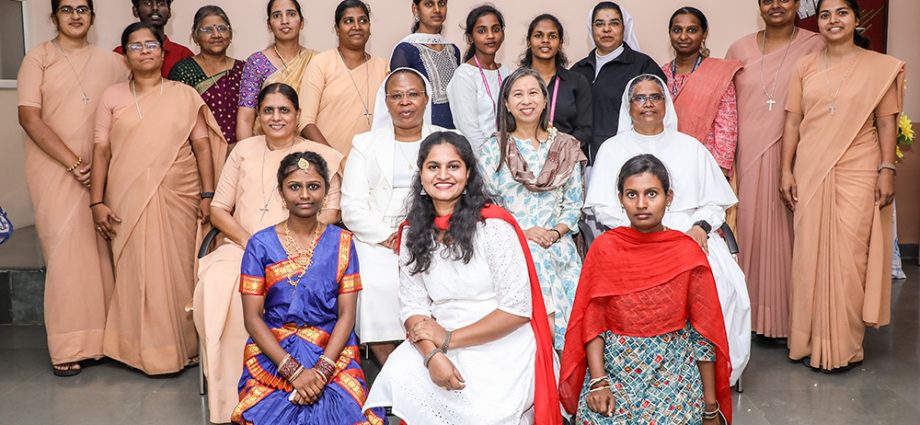By Thomas Scaria
Bengaluru, April 18, 2024: Members of six women congregations have come together to empower “youth at risk” in Bengaluru, a southern Indian city with more than 3 million youth.
“This is the perfect example of synodality in action as envisaged by Pope Francis,” said Apostolic Carmel Sister Maria Nirmalini, leader of the Conference of Religious India, representing the country’s more than 130,000 Catholic women and men.
The “Sisters Led Youth Initiatives” project is jointly implemented by the members of the Apostolic Carmel, the Daughters of Mary Help of Christians, the Missionary Sisters of Mary Help of Christians, the Salesian Missionaries of Mary Immaculate, the Poor Handmaids of Jesus Christ, and the Sisters of St Joseph of Tarbes.
“Our aim is to make youth dream high, think better and act great,” said Sister Jane Wakahiu, head of the Catholic Sisters Initiative, which supports nearly 1,200 young people under the program.
The Kenyan nun was speaking at the March 19 graduation ceremony for the first batch, mostly women who were trained in vocational skills by the six congregations.
“Women religious in India have played significant roles in empowering youth at risk, especially the vulnerable women in society,” observed Wakahiu, a member of the institute of the Little Sisters of St. Francis.
Sabrina Wong, a project officer who oversees the project in India, finds the program’s uniqueness in the “beauty of various religious congregations working together to empower the youth.”
Nirmalini, who is also the superior general of her congregation, told GSR that the women congregations in India will experiment more with such collaborative projects as part of its strategic plan.
On the occasion, the Conference of Religious Women India released its strategic plans for the next five years.
The 2024-29 plan stresses projects and programs to empower youth, women and underprivileged populations in India, to be implemented as a partnership project of nuns from different congregations.
Nirmalini, who chaired the graduation ceremony, said the program reinforces the feeling that “we are not alone” and “we are for everyone.” She applauded the congregations for coming forward to empower the weaker sections.
“We don’t know the future of our missions in India, but we are sure to stand united in partnership and face the challenges together,” said Nirmalini, hinting at certain hate campaigns against Christian institutions in India.
“The strategic plan stresses intercongregational collaboration, research and outreach to champion inclusiveness, empower the marginalized and drive systemic change,” Nirmalini told the gathering.
Wakahiu, who received the first copy of the plan, noted that it resonates with the Hilton Foundation’s motto to promote intercongregational projects for its sustainability.
Later speaking to GSR, Sister Wakahiu said the Bengaluru program is a pilot project supported by the foundation, which plans to support more such collaborative programs in India.
Sister Molly Mathew, the executive director of programs and projects for the Conference of Religious Women India, said the “Sisters Led Youth Initiatives” began with 600 youths in September 2023.
“Almost half of them have undergone a three-month refresher course, and they have already secured jobs after graduation,” explained the member of the Missionary Sisters of Mary Help of Christians, who coordinates the Bengaluru program. “Others are still undergoing the yearlong course.”
Some nuns shared their experience of working for youth empowerment.
Apostolic Carmel Sister Jenita Mary said her congregation enrolled 150 students for its tailoring and fashion designing courses.
“Most of them are women in at-risk situations who lack self-esteem. So, we offer holistic training, combining vocational skills and life skills,” she said.
St. Joseph of Tarbes Sister Irudaya Mary said her congregation recruited 120 young men and women from Bengaluru’s slums to train them as entrepreneurs.
“Besides training them in some vocational skills, we have connected them with various government projects where they can get loans and subsidies to start self-employment programs,” she said.
Salesian Sister Praveena Madhavan said the Salesians cover some 150 students under the Hilton project.
“Our goal is to ensure each student gets jobs after the course. For this, we invite corporates for a campus recruitment and it has really worked,” Sister Madhavan pointed out.
Some students who have found jobs or started entrepreneurship after the training, shared their experience at the graduation program.
Deepika (single name), who learned tailoring and fashion designing, said she could start a boutique and earn about 20,000 rupees (US$243) a month.
“More than anything, I gained more confidence in life to build my family with dignity,” she said.
Raja Manikyam, a 21-year-old school dropout, said he would complete the intermediate exam this year with the help of St. Joseph of Tarbes nuns. “I was in the dark when the sisters lifted me up,” said the youth, who now dreams of becoming a chartered accountant.
Sr. Mini Joseph of the Society of Jesus Mary Joseph, a nurse, told GSR that the Sisters Led Youth Initiatives is an example of how sisters from different congregations can work together.
“To empower the weaker sections, we have to get ourselves empowered and secured first, and these intercongregational collaborations enhance that possibility,” she added.
(This first appeared in globalsistersreport.org on April 10, 2024.)


New thinking is vital for togetherness, on-going-ness, and nation-building.